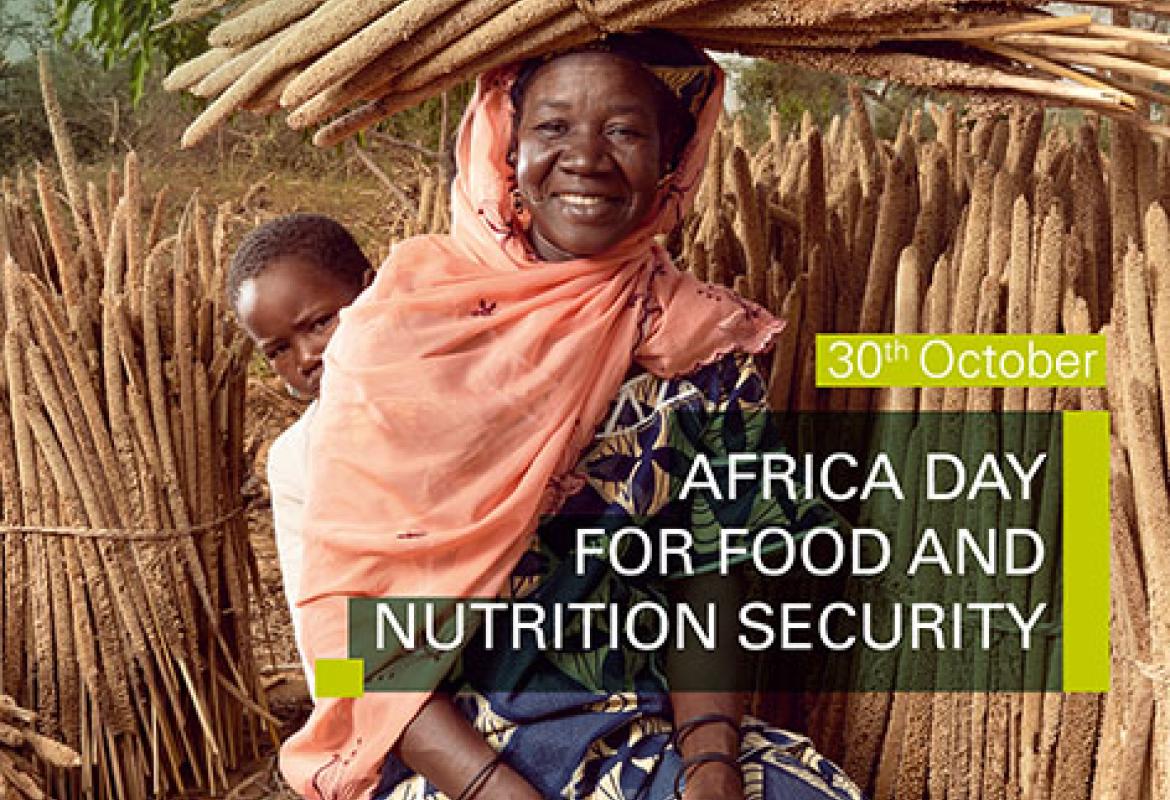AFRICA DAY FOR FOOD AND NUTRITION SECURITY
Maseru, 31 October 2024
The African Committee of Experts on the Rights and Welfare of the Child’s (the Committee) Working Group on Climate Change and Children's Rights (the Working Group) joins AU Member States, Regional Economic Committees, and all concerned stakeholders across the continent to commemorate the Africa Day of Food and Nutrition Security on 30 October 2024.
The African Day of food and Nutrition security is an opportunity for Member States of the AU to assess the extent to which all its citizens, especially children, have sufficient access to healthy food and nutrition. Recalling article 14 (2) (c) (d) of the African Charter on the Rights and Welfare of the Child (ACRWC) which requires States to ensure adequate nutrition and combat malnutrition, and the commitment under Aspiration 5 of Africa’s Agenda for Children 2040: Fostering an Africa Fit for Children, that every child grows up well-nourished and with access to the best necessities of life, and other international policy goals ‘including achieving, by 2025, the internationally agreed targets on stunting and wasting in children under 5 years of age’, the Committee applauds the AU and African Heads of State for the commitment undertaken, so far, to find durable solutions to Africa’s growing food and nutrition crises.
Climate change has an adverse impact on food and nutrition in Africa and has the potential to reverse the important gains made in the implementation of the rights of children to have sufficient access to healthy food and nutrition. Droughts and floods, whose severity and frequency are exponentially increased by the impacts of climate change, are the primary climate challenges affecting children’s rights in this regard. During the Africa Climate Summit in September 2023, it was noted that Africa accounts for 44% of all severe droughts recorded globally in the past century. According to the UN, droughts have affected more than 1.4 billion people between 2000-2019, with Africa being home to the highest number of droughts- 134, where 70 of them happening in East Africa.
Research by Save the Children shows that children born in 2020 may face nearly three times the droughts and crop failures experienced by previous generations, with the heaviest impacts in developing countries. Rising CO₂ levels and temperatures pose the biggest threat to future agriculture, as 27 countries particularly vulnerable to greenhouse gases are also hunger hotspots. By 2050, climate change could contribute to 250,000 additional deaths annually from malnutrition, malaria, and heat stress. The impacts of dry conditions on crops and severe flooding from events like Cyclone Freddy in early 2023 have heightened the vulnerability of food systems, leading to rising hunger in both urban and peri-urban populations. Food insecurity affects both urban and rural areas across several African countries, with climate shocks and associated conflicts, displacements, inflation and rising global commodity prices, contributing to increased hunger in 2023 and 2024.
Cognizant of the complexity of addressing challenges of food and nutrition in the context of the climate crisis; the Working Group encourages State Parties to strengthen existing measures and forge innovative initiatives to reverse all these intractable drivers to the worsening food and nutrition insecurity in Africa. The Working Group urges Member States to collaborate with other stakeholders, such as international partners, civil society organizations working in the food and nutrition, climate change and conflict resolution sectors, to accelerate their commitment to ending the growing food and nutrition insecurity in Africa.
The Committee, and specifically its Working Group, on this occasion of the Africa Day for Food and Nutrition Security, further urges Member States to:
- Adopt and implement laws, policies, programs, and other institutional measures to regulate the inclusion of additive substances in children’s food, ensure access to adequate nutrition, and combat disease and malnutrition;
- Develop climate change adaptation strategies that integrate nutrition, agriculture and food security, maternal and childcare and feeding practices, health, including environmental health and water and sanitation;
- Ensure that children and their families in areas susceptible to food crises brought on by climate change are equipped to deal with the effects, by increasing national capacity for alternative feeding, micronutrients, and models for alternative, climate-adapted crops, sustainable food systems, anticipatory action, and shock-response systems, among other things;
- Expand social security to areas affected by armed conflicts and climate change (including cash transfers) and hunger-relief programs; and
- Ensure climate information is accessible to affected communities and decisionmakers, including children;
- Encourage subsistence farming, reduce or completely remove red-tapes in the food distribution chains at the all levels (national, regional and international) to ease the movement of food to communities most affected by food and nutrition insecurity.
National Human Rights Institutions, Civil Society Organizations and other nonstate actors are urged to:
- Generate evidenced-based information on effective adaptation strategies to climate change induced food insecurity, child hunger and malnutrition;
- Collaborate with relevant government institutions and key stakeholders to combat child hunger and malnutrition in the face of climate change; and
- Raise awareness about climate change and its impacts on food systems in order to improve the resilience and preparedness of children, families and communities.
- Collaborate with relevant government institutions to encourage subsistence farming, device innovative methods of irrigation, in areas affected by drought and to facilitate food transportation and distribution to communities affected by food insecurity.
Development partners, Developed Countries and International Organizations are urged to:
- Ensure a rights-based approach to climate action, with the best interest of children at the center, to bring about system-wide sustainable change.
- Finance child-sensitive adaption in developing African countries with low adaptive capacity with a view to addressing food insecurity.
Address loss and damage, through a rights-based response, specially to agricultural and food systems, in the context of drought and famine and in relation to sudden climate hazards that render children vulnerable to hunger and malnutrition.







